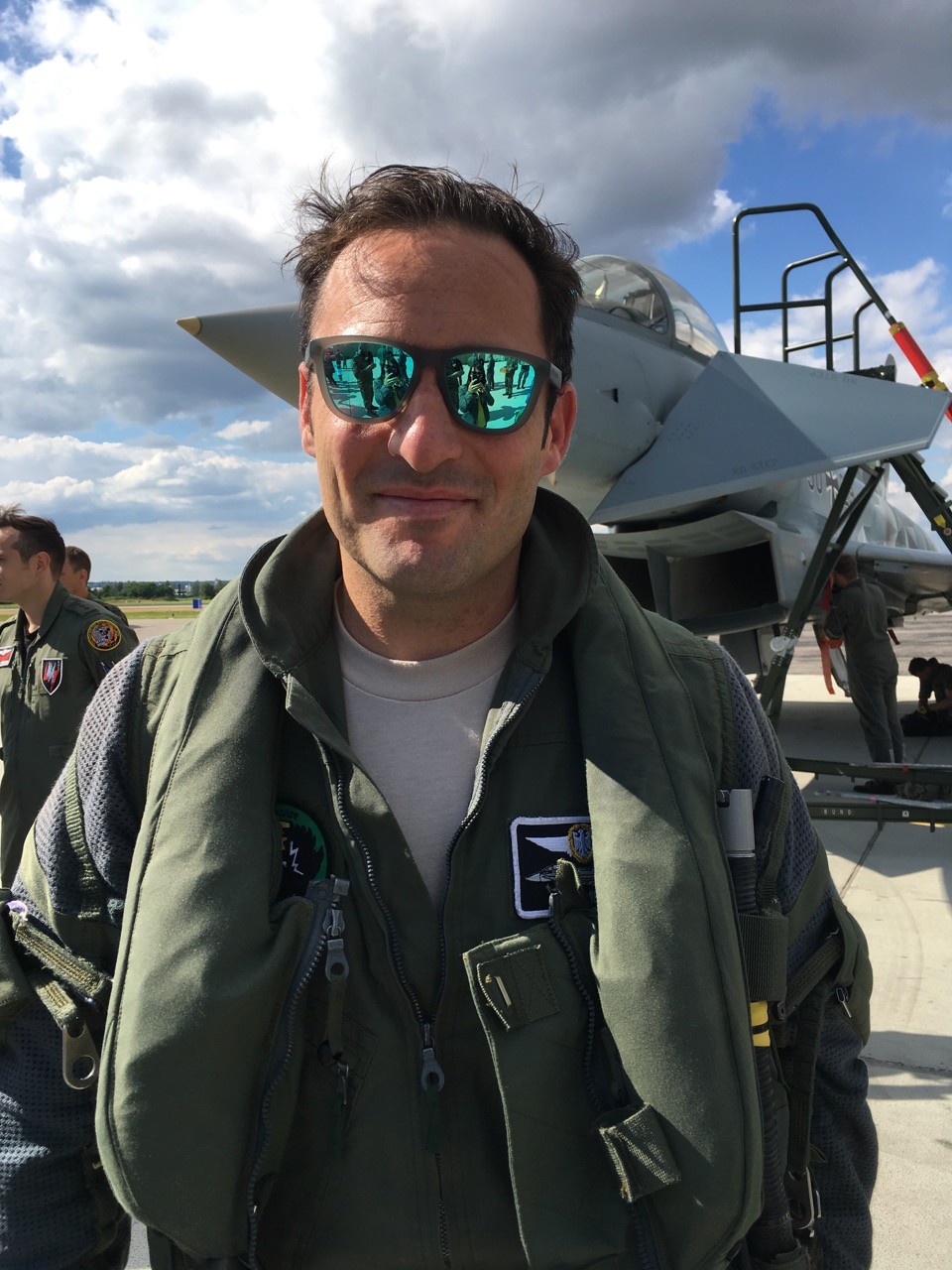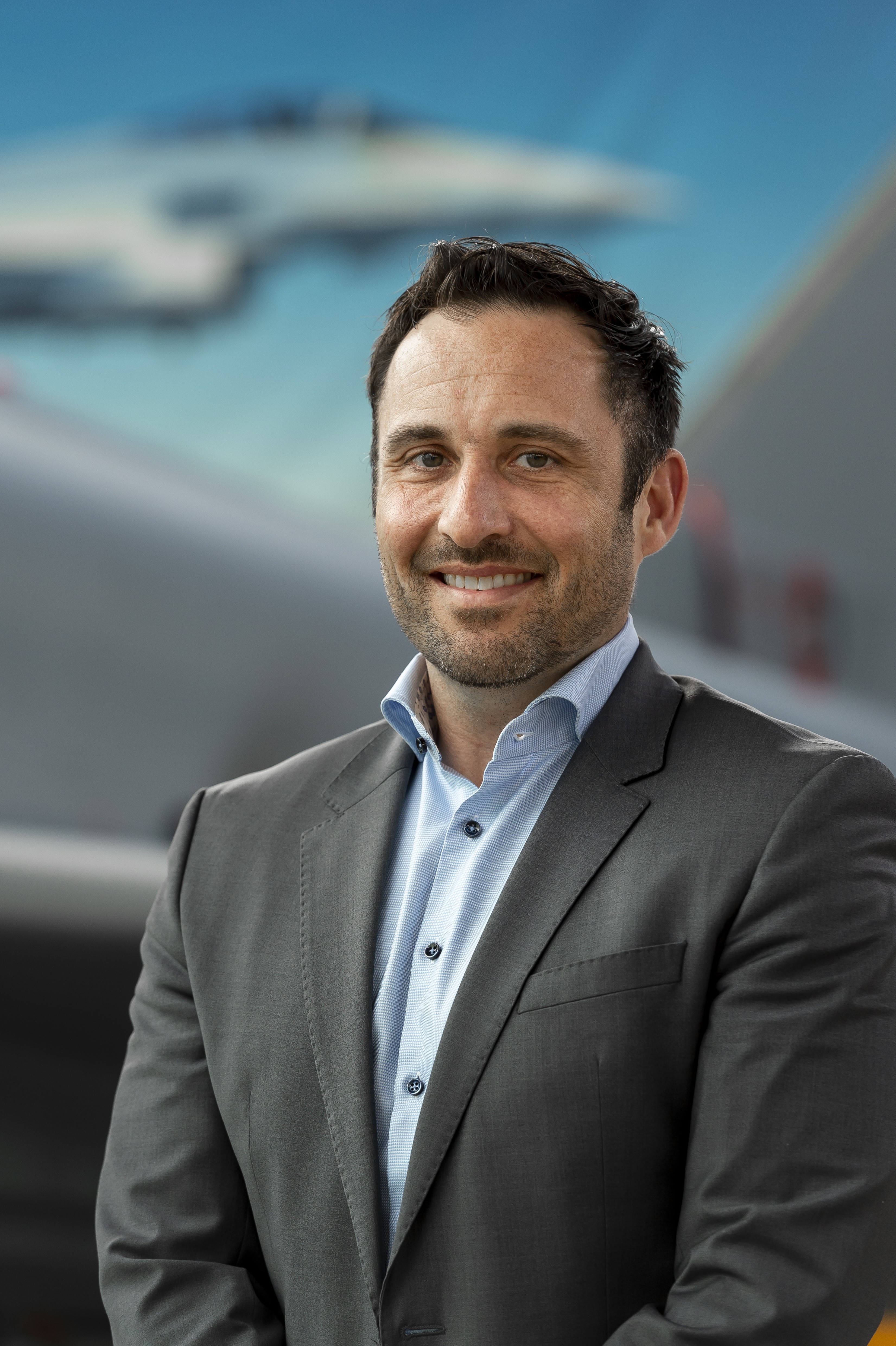
Marco Gumbrecht
He went on to clock up more than 2,700 flight hours on fighter aircraft, including a decade on Eurofighter Typhoon. One of the first Eurofighter Typhoon Weapons Instructors, he was also deployed on a number of NATO operations throughout a highly distinguished career.
Today he is Head of Future Business Eurofighter and Military Relations in Combat Aircraft Systems for Airbus Defence and Space.
How was it moving from flying Eurofighter to flying a desk?
Nothing beats being in the cockpit. I left the Luftwaffe 20 years after I began my career and it was the most significant change in my professional life. In my last Luftwaffe role, I reported directly to the Air Chief. As one of the first operational pilots, pretty much everybody in the air force knew me.
However, coming into industry while you are respected for what you’ve done, you’re pretty much starting from scratch. It’s a humbling experience.
Of course I miss flying, but being a fighter pilot is a job and we know it is going to end sometime. I was lucky in that I had carried out desk jobs almost from the cockpit. For example, I was Director of Flying Operations while flying as well, and that was the beauty of it. Coming to Airbus I’d been involved in a lot of programmes and Project Management, but a lot of things were new to me, working with colleagues from finance, for instance. I started off initially in Business Development but I always wanted to get involved in the programmes. I’m just very grateful to have this department and to be able to contribute.
How has your experience flying Typhoon shaped your interaction with business colleagues when discussing programme issues?
The person in the cockpit doesn’t care about how the consortium is set up, they care about the efficiency of the jet and we must never forget that. At the end of the day that is what it is all about, this is a weapon system.
I try to create a bridge between my past as an operational pilot and being the guy in a business suit, managing and setting up the contracts and making sure we address the right things.
That doesn’t mean me playing the retired Lieutenant Colonel and telling everyone what a great pilot I was. It means looking at certain things in a positive way, asking, ‘have we thought about that?’. And if I do think we need to explain things better, it is being the mediator that brings the two sides closer together.
I try to make myself go back in time and consider how would I explain something to my pilot self and what would I have said about the consequences? That’s how I go about it.
How has your view of ‘industry’ changed over that time?
I’ll be honest. When I was a pilot there were times when I was critical of industry. Now I’m in the mix and I can understand things better.
I could probably explain to my former self why some things aren’t working the way I might have expected. That insight comes with the greater depth of understanding. The reality is this programme was solely set up not just with regard to operational capacity, but it was also as an industrial programme.
That makes it different to the way other programmes work. However, we must never use this as an excuse. I have a dual role and I’m responsible for military relations for combat aircraft systems for Germany and Spain and I try to educate both sides on why things are the way they are.
What can industry learn from ‘incoming’ practitioners?
There’s not a higher feedback intense environment that I’m aware of than in the fighter pilot community. That is something industry could learn from.
We need to get better at meeting efficiency. One of the things I did as soon as I got more responsibility was try to give meaning to every meeting.
I question if we need a meeting? Would a phone call be sufficient? If we do have meetings, we need have some objectives. And more importantly, we need to reflect on those objectives. You can burn a lot of time and resource having meetings with no real outcome.
You get direct, quickly delivered feedback. If you do something badly in a jet you see it directly in the debriefing.
What leadership qualities have you been able to transfer from the military to industry?
When it comes to leading you have to take decisions and have the ability to leave your comfort zone and take responsibility. Those are basic traits that any military leader has to have.
There’s also leading by example. There is a mantra that weapons officers and fighter pilot instructors share: ‘Always be humble, credible, approachable’. These programmes are way too complex to even think that you can do anything by yourself, even just preparing the decision-making process.
There are a lot of people here that are better than me at certain things. And that's part of being a leader, recognising that and finding the right people to do the right job and enabling them to get on.
What can the military learn from ‘industry’ processes?
Industry is really good at creating the working environment and recognising that being efficient does matter. It is the little things, like when your computer isn’t working. It gets fixed.
Obviously, inside the cockpit, things matter and people move at speed and get things done. But once you left the cockpit that sense of urgency and who was in charge of what wasn’t always that clear.
You need people to make your life easier so you can do your job. Getting things done in the military caused me many headaches. That is certainly not the case in industry.
What is the most satisfying part of your role?
To be part of helping to shape the future of the Eurofighter Typhoon. It has been part of my life for so long.
I’ve loved the aircraft from day one and seeing it start to go through its Long-Term Evolution and playing my part in shaping and delivering that, it is really gratifying to me.

Marco Gumbrecht
